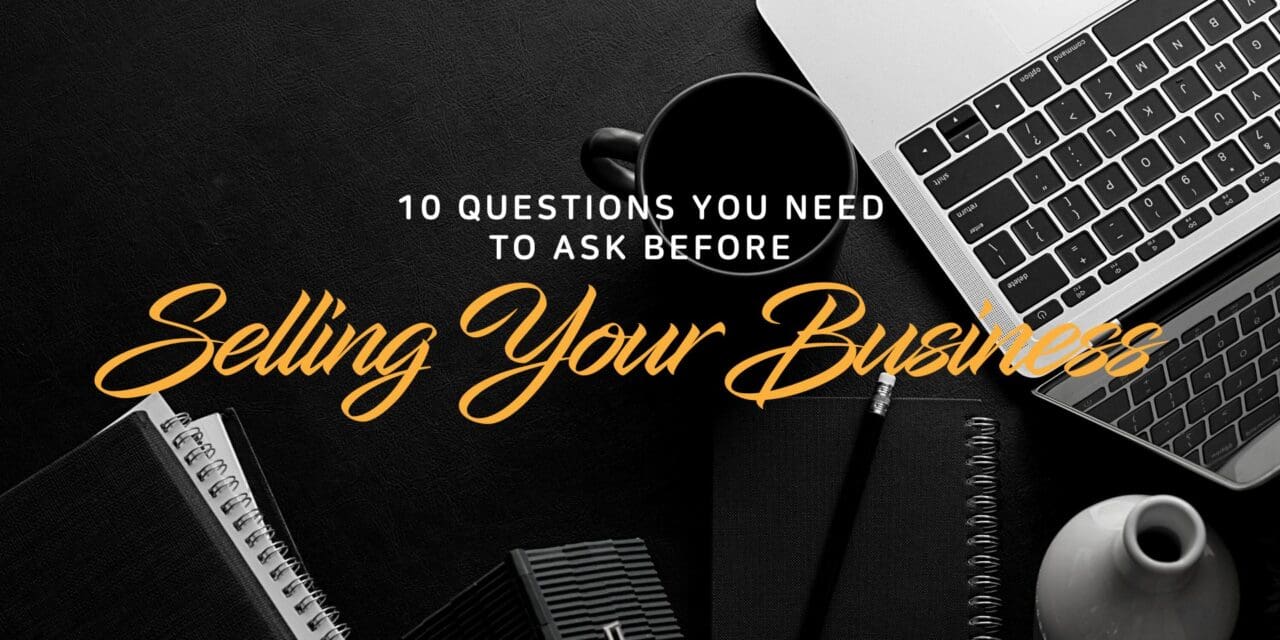- To create a successful enterprise that gives them ongoing income.
- To build an asset they can sell when the time is right.
When it comes to the latter, there’s a lot of work that occurs prior to selling a business to ensure it commands the price it deserves, and you reap a good return on what can be years of invested time, energy, and resources.
With that in mind, here are 10 questions you need to ask before selling your business.
Why am I selling?
You might wish to sell your business for a number of reasons. Perhaps the passion is gone, or you’ve taken the business as far as you feel you can. Maybe you’re looking for a new challenge, or the enterprise has achieved everything you dreamed it would.
On the other hand, maybe you’re selling for reasons beyond your control, such as illness or changed life circumstances.
Clearly understanding the ‘why’ behind the business sale helps you define when that sale should occur and under what circumstances. It also helps you put the right things in place to ensure you attain the return you’re looking for.
What result do I want?
Sure, selling the business might be the first thing that springs to mind, but think long and hard about the result you actually want.
Do you still have passion for the business, but are tired of the day-to-day? Or are you at a point where you’re keen to enjoy more time off.
If the answer is yes to either of these questions, is selling the right course of action for you? Or would you be keen to become a silent partner in the enterprise or perhaps run the business under management instead?
On the other hand, maybe you’re clear that it’s time to make a clean break. But in this instance ask yourself, what result am I looking to achieve from the sale? Is there a specific price that needs to be achieved to attain the lifestyle you wish for?
This helps you define what needs to be in place prior to selling, and also who might be the ideal candidate to purchase the operation.
When do I plan to sell?
While some may need or wish to exit their business quickly, others might have time available to plan the sale and ensure the business is in the best position possible.
Either way, selling a business can take time, and this period should be used to ensure systems and procedures are up to par, the right staff are in the right positions, and profit is maximised.
In other words, selling a business for maximum return involves planning that includes goals the business will achieve, comprehensive documentation and a clear exit strategy.
How will my business be sold?
There’s more than one way to sell a business. For example, you can open it up to partners, sell ‘shareholdings’ in the operation, or sell the going concern but not the business premises.
Consider how you would like the sale of your business to look, and what involvement (if any) you would like in the operation in the future.
What price am I looking for?
Naturally, you will want the best price possible for the business you have built. But it pays to research what price your business is likely to command in advance of selling, and put strategies in place to ensure you can achieve the outcome you want.
To assist, you might consider speaking with a business broker or valuer earlier, then engage a coach or strategist to help you get the business to where it needs to be.
You will also need to determine what exactly a potential buyer will need in order to pay the fee you’re looking for, including, but not limited to:
- Profit and loss documents
- A business plan
- Assets and liabilities
- Staff costs
- Stock
What needs to be in place?
This brings us to the question of what needs to be in place to guarantee a successful sale? What key staff members are required, what roles do they fulfill, what systems and procedures should be established?
The aim is to make your business as clear, appealing and streamlined as possible before you begin the sales process.
Who is my ideal buyer?
Just as every business has an ideal client, every enterprise has an ideal buyer.
Who is most likely to purchase your business? Is it someone in search of a lifestyle change, a bigger organisation seeking to diversify into your service or industry, a competitor looking to capture your market?
Consider who your ideal buyer is likely to be and start working to make your business more appealing to them. And remember there may be more than one ideal buyer.
How long will the transition take?
While some businesses can be exited quickly, others will require a transition period, where the new owner has training in how the business operates.
Ask yourself, how long would a new owner need to understand the workings and mechanisms of the operation, and how long are you prepared to spend attached to the business to ensure a seamless transition?
How will the business be marketed?
Marketing will be key to a successful sale. Long before your business is listed for sale, consider exactly how it will be marketed and where.
You can do this in collaboration with a business broker or undertake some preliminary research yourself, factoring in the information a potential buyer would need, who that ideal buyer is and what you will have in place when it comes time to list the business for sale.
What will I do next?
Although much of your focus will be dedicated to ensuring a successful sale, don’t forget to consider what you will do next.
Perhaps it’s retirement, maybe it’s another business, or perhaps it’s some time off to consider your options.
Whatever it is, have a clear plan for what you will do once the business is sold, so you can make the most of the opportunity.
The final word
If you’re considering selling your business in the immediate or long-term, I’m available to assist with strategies and business planning to maximise the return on your investment.
Talk Strategy with Clive
With more than 30 years’ experience in mentoring small to medium-sized businesses around Australia. Clive works with company owners and their teams to grow their business and achieve goals through strategic coaching.


















